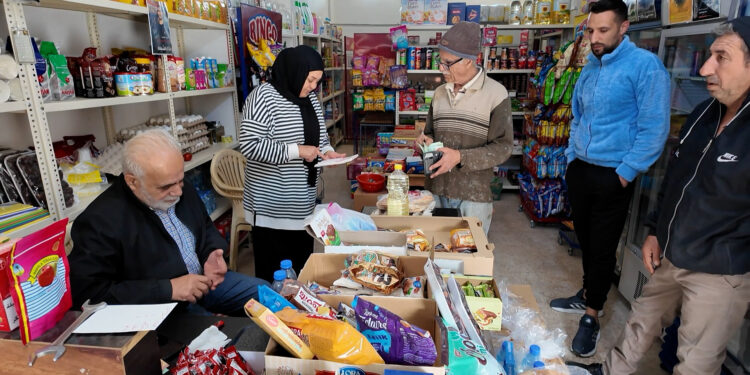Al -Jazeera Net Correspondents
photo- Along the rubble of the destroyed shops in the town of Al -Mansouri, the district of Tire in southern Lebanon, Muhammad Sorour installed his new tent, which he turned into a small scale, in which he sells vegetables and foodstuffs to the people of his village. This move came after the last Israeli war was destroyed by its previous state in the town square.
Despite the humility of this newly new shop, it is considered an essential necessity for the returning people, especially in light of the destruction of most shops in the town, where life without these facilities becomes almost impossible.
Return despite the great losses
Sorour talks to “Al -Jazeera Net” about his initiative, “He lost his old shop and his home together, describing his loss as” very large. “However, he had nothing but the option to return to his town, and to restore life to the market in it. We learned patience, and we have prepared our lives despite all the continuous Israeli challenges and violations. This simple tent will help the town to secure their daily needs, and we will continue in this work, whatever the circumstances. “
Muhammad Zain, also, had an epic and a chicken sale, but he lost them completely due to a series of Israeli raids that targeted the shops in the town. Zain is estimated at more than $ 30,000, yet he did not retract a return to Al -Mansouri, as he bought a ready -made house and turned it into a new chicken store.
Zain asserts: “This store is important for me and my family, because it is our source of livelihood. It also provides the townspeople to move to the city of Tire to buy their needs. After the war, the shops were completely destroyed, but we decided to follow up. Many merchants took the same decision, because life without integrated economic institutions is impossible.”
New stores despite security tensions
Despite the repeated Israeli violations and targeting some areas of the south from time to time, some people decided to open new institutions. Among them is Mohamed Zain, who finally launched a clothing store on the public road of Tire-Naqoura. Zain says: “We know that the situation is no longer its normal yet, and the risks are still in place, but we cannot surrender. We have to continue and face these difficulties, and we prove that this land is able to embrace its people again.”
Hussein Melhem, the owner of an old shop that was destroyed by the bombing, returned to the town of Al -Mansouri after the announcement of the ceasefire, to reopen a new shop in a nearby place. Speaking to Al -Jazeera Net, he says: “We returned from under the rubble and we started again.
Daily necessity
On the Naqura Road, Ibrahim Zain has a store selling electrical and building materials, a fully destroyed store in the July 2006 war, but Zain and his siblings have rebuilt it again. In the last war, the store escaped the bombing, which prompted it to insist on reopening it despite the prevailing anxiety in the airspace.
Zain says: “People are currently buying from our store the supplies of restoration, because the reconstruction process has not started yet. Most of them do simple work, such as repairing bathrooms and walls, in preparation for returning to their homes.
As for the traffic on the Al-Mansouri-Naqoura road, it is still shy, due to the great destruction of the border villages. This directly affected the shops located on the Naqura highway, which depends mainly on the people of these villages.
Al -Samoud despite the absence of the movement
Hassan Khashab, the owner of the tire sale and repair store, confirms that he was severely affected by the war and its consequences. But despite the recession, he reopened his store, and says: “We open the store and close it to no avail. There is no actual work, but rather a very modest movement. But we are forced to stay, because we need to feed our children.”
Hassan Melhem, who works in the field of restoration and plumbing, has returned to his town to help people repair their affected homes. “These stores provide us with time and effort, especially in light of the high prices. Going to the city is very expensive. Stores that sell sanitary ware and building materials are necessary at this stage.”
Another kind resistance
In turn, Jamal Zabad confirms that the continuation of life requires the presence of active economic institutions, considering that the expansion of the population in villages imposes the creation of more of these stores to achieve self -sufficiency.
Zabd sees the return of the people to their towns despite the difficult conditions in a form of resistance, saying: “The steadfastness of people in their land makes us stick to it more. We will not abandon them. Even if our homes are destroyed and our seasons go, we will return, cultivate the land and open our stores again.”
Although the security situation in southern Lebanon has not yet stabilized, the owners of economic institutions insisted on returning to their villages and returning life to their shops. These institutions are directly related to the daily lives of citizens, and they are all hoped that the situation will be stressed and the south returns to its previous era, more powerful and persistent.



